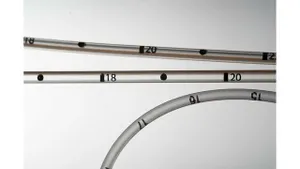Sign up for the PlasticsToday NewsFeed newsletter.
Sponsored By
ACC announces aggressive bag recycling goals
The American Chemistry Council’s (ACC; Arlington, VA) Progressive Bag Affiliates group will mandate 40% recycled content in all plastic bags by 2015, including at least 25% postconsumer recycled plastic, in a bid to more proactively address environmental group and legislative pressure that’s pushing to regulate plastic b
Tony Deligio
April 22, 2009
4 Min Read

Plastic bag maker Hilex Poly placed 30,000 Bag 2 Bag recycling bins in grocery stores across the U.S.
The American Chemistry Council’s (ACC; Arlington, VA) Progressive Bag Affiliates group will mandate 40% recycled content in all plastic bags by 2015, including at least 25% postconsumer recycled plastic, in a bid to more proactively address environmental group and legislative pressure that’s pushing to regulate plastic bags into oblivion in some areas. Announced on April 21, the Full Circle Recycling Initiative will allow participants to individually decide how to support the goal, with the ACC expecting the industry to invest about $50 million to overhaul manufacturing processes so they can add recycled resin to new bags. In terms of environmental impact, the initiative would reportedly result in the collection of 470 million lb of recycled plastic annually for the manufacture of new bags. On an annual basis, this would reduce greenhouse gas emissions by an estimated 463 million lb and eliminate 300 million lb of waste. The ACC also estimates that by requiring less virgin resin to be consumed, enough natural gas would be conserved to heat 200,000 homes.Saying the program represents a “new plastic bag for the 21st century, ACC President and CEO Cal Dooley explained, “Plastic bag makers have listened to policy makers and customers and are launching an initiative that will make a lasting positive impact on American communities.” The ACC says plastic bag and wrap recycling has increased in recent years to an estimated 830 million lb in 2007, up 27% from 2005.
The ACC says additional material will need to be collected for manufacturers to reach the recycled content goal, and the Progressive Bag Affiliates will continue working with major grocery and retail chains to increase at-store programs that allow shoppers to bring back used plastic bags and wraps. Progressive Bag Affiliates members include bag makers Advance Polybag, Hilex Poly Co., and Superbag Corp., as well as resin suppliers like Dow Chemical, ExxonMobil, NOVA Chemicals, and Total Petrochemicals.
Hilex Poly (Hartsville, SC), the largest producer/recycler of high-density polyethylene (HDPE) t-shirt bags globally, launched its own cradle-to-grave recycling effort for plastic bags several years back. In a presentation at Chemical Market Assoc.’ World Petrochemical Conference (MPW’s coverage here), Derek Gowdy, VP supply management at Hilex Poly, said that as part of its effort, the company has paired with numerous retailers to install Bag 2 Bag bins where shoppers can return plastic bags. In an April 22 press release, Hilex Poly used Earth Day to announce it has placed 30,000 such recycling bins in grocery stores across the U.S. Hilex Poly has also launched the e3 line of reusable bags, and created a website to track the issue.
Beyond the positive environmental and public relations impact, Gowdy said the initiative has been a money maker for Hilex Poly, which is already offering a line of bags with 25% recycled content. The reclaimed resin in the bags gives them a gray tint, which Hilex Poly markets as, “Gray is the new Green.”
In some ways, the effort has been a success—Gowdy said at the time of his presentation, there were 80 pieces of legislation to ban/tax bags, down from 147 at the same time last year—but in other ways, no amount of recycling by bag makers would sway public opinion. “Some areas of the West Coast,” Gowdy told the crowd, “their minds are already made up [regarding plastic bags].”
Hilex Poly says it operates the world’s largest plastic-bag recycling plant in North Vernon, IN. It has collected and recycled more than 30 million lb of used plastic bags and films from grocery stores since opening the $20 million facility.
According to the EPA’s 2007 report on U.S. municipal solid waste (MSW), just over 4 million tons of plastic bags, sacks, and wraps were generated in MSW in 2007—the third largest category for plastics behind durable and non-durable goods. Including HDPE, PVC, LDPE, LLDPE, PP, PS and other resins, 4.190 million tons of bags, sacks and wraps were created in 2007, with 380,000 tons, or 9.1%, recovered. By weight, paper and paperboard products made up 50.9% of containers and packaging generation, while plastics accounted for 17.4%. Glass represented 14.6%, with wood at 11.3%, and metals at 5.8%. —[email protected]
About the Author(s)
You May Also Like


